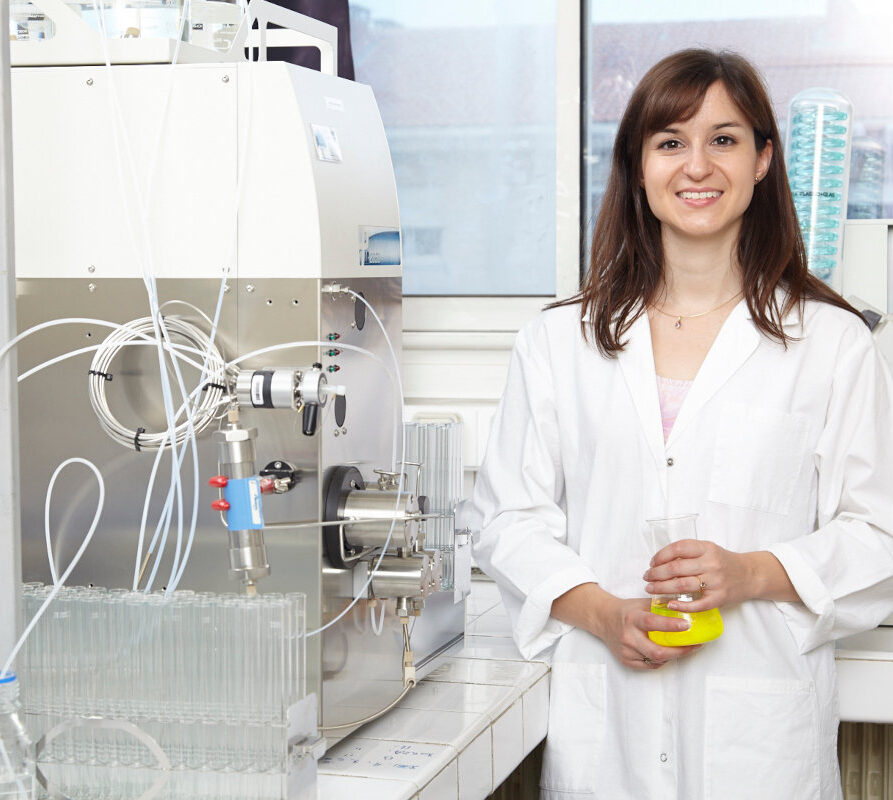Cécile Echalier: focus on biomaterials
Cécile Echalier's research goal is to develop new biomaterials that will have highly anticipated applications in health and regenerative medicine. The chemist from the Max Mousseron Biomolecules Institute has just been appointed associate professor at the University of Montpellier, where she herself studied as a student.

Initially, Cécile Echalier did not enroll in a chemistry degree program at the University of Montpellier with the intention of pursuing research. "I was passionate about teaching and wanted to attend the IUFM after completing my degree to become a school teacher," recalls the young researcher. It was a clear path that chance would turn upside down. In their first year of master's studies, chemistry students must complete an internship that is assigned to them... by lottery. For Cécile Echalier, it would be peptide chemistry with Gilles Subra, professor at the University of Montpellier and researcher at the Max Mousseron Biomolecules Institute. This encounter would divert her from a career as a school teacher. " This experience was an opportunity for me to discover what research was all about, but I was still attracted to teaching, so I wanted to do both."
Gilles Subra listened attentively to this new vocation, suggesting that the young student join his team if she decided to write a thesis. The idea matured in the student's mind during her Master's 2 program, which she spent partly at the University of Glasgow, where she did a six-month internship in the field of chemobiology.
New hybrid materials
Upon her return in 2013, she joined the Amino Acids, Heterocycles, Peptides, and Proteins team atthe Max Mousseron Biomolecules Institute to work onher thesis. "I chose a project that was starting from scratch because I wanted to prove the concept."This project was based on a relatively new topic at the time: hybrid biomaterials. In collaboration with Ahmad Mehdi fromthe Charles Gerhardt Institute in Montpellier, the young researcher combined the expertise in peptide chemistry and inorganic chemistry of these two laboratories to create new hybrid hydrogels.
"The idea was to apply sol-gel chemistry to the synthesis of materials used in the healthcare sector, which was quite pioneering at the time," recalls the chemist. The development of these biomaterials requires the use of green chemistry, "the processes involved must be compatible with living cells, which means we cannot use toxic solvents, for example."
This was a challenge that Cécile Echalier tackled head-on during her three years of doctoral research, during which she authored five articles as lead author, and a topic that is gaining momentum. "At the end of my thesis, I trained three doctoral students in the chemistry of these hybrid materials, who then continued the research I had started, "she explains. In 2016, she was awarded a L'Oréal-UNESCO fellowship, which the chemist used to purchase a 3D printer and thus further her work in creating materials.
Useful purpose
After completing her remarkable thesis, Cécile Echalier left for Heidelberg, Germany, to pursue postdoctoral studies, where she temporarily abandoned the field of biomaterials to work in chemobiology. Although she changed subjects ,the young woman remained true to her guiding principle: " I need to know that my research will serve a useful purpose. It's not just me having fun in my lab; it has to be useful for something."In this European molecular biology laboratory, the researcher developed probes to study the activation mechanism of drug candidates.
A "useful" postdoctoral fellowship was followed by a second, this time at Imperial College London, where Cécile Echalier returned to her beloved biomaterials for two and a half years, never to leave them again. Upon her return to France in 2021, she resumed her position at the University of Montpellier, where she obtained a temporary teaching and research position (ATER). In terms of teaching, the new ATER gives courses at the Faculty of Pharmacy, as well as at the IUT in Sète and the Faculty of Sciences. The teacher enjoysaddressing "a very diverse audience, which is destined for careers in research as well as engineering and technical fields."
When it comes to research, the young woman always returns to the IBMM. There she reunites with Gilles Subra and the field of biomaterials, which is experiencing a new boom in 2022 with the launch of Nanoremedi, a research and training program run jointly by six European universities that aims to train doctoral students in the field of peptides and nanomaterials and has received funding from the Marie Skłodowska-Curie Actions Doctoral Network.
Medical applications
In collaboration with Danièle Noël's team atIRMB and other partners in the European consortium, chemists are working with Nanoremedi to develop new materials for regenerative medicine. The research team is focusing in particular on three medical applications: "the engineering of vascular grafts to replace damaged arteries, the development of stem cell-based biotherapies for bone and cartilage repair, and the development of strategies to promote implant integration and prevent bacterial contamination," explains Cécile Echalier.
A little over a year after the project was launched, 13 doctoral students were recruited to carry out these ambitious objectives. And Cécile Echalier has just taken a new step in her career: "On November1, I was appointed lecturer at the University of Montpellier. This is an important moment because it now allows me to apply for funding as a project leader." The chemist has already submitted an ANR Young Researcher project aimed at developing even more environmentally friendly chemicals, this time compatible with 3D printing techniques. The response is eagerly awaited for the end of 2024.
